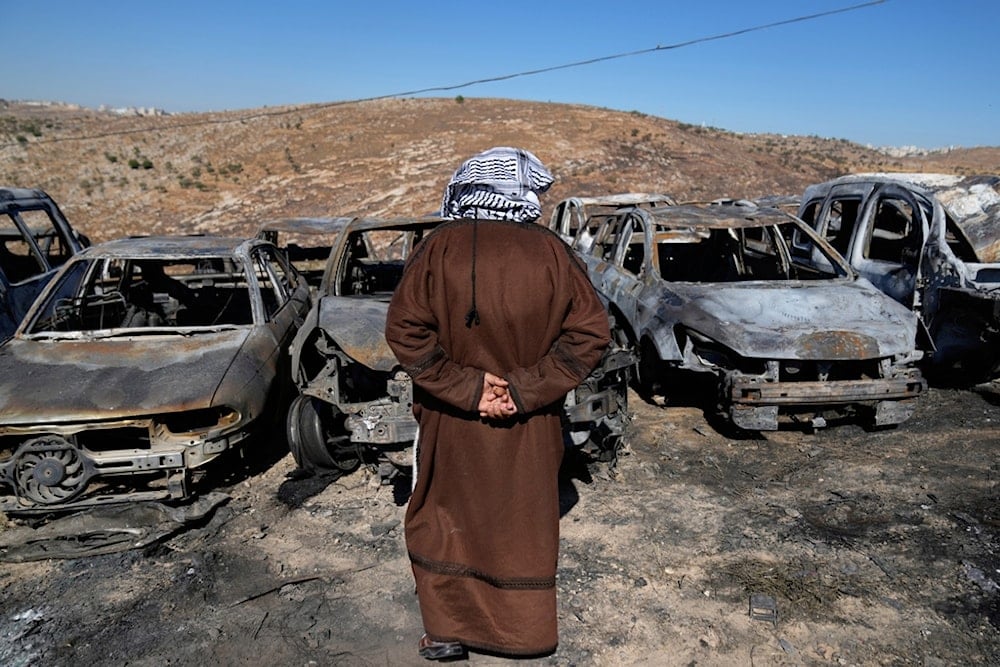Palestinian factions reject Israeli vote on West Bank sovereignty
Palestinian factions condemn Knesset’s vote to extend Israeli sovereignty over the West Bank and Jordan Valley, calling it illegal and a threat to Palestinian rights.
-

Palestinian landlord Saber Asaleyeh, 74, inspects his scrapyard where vehicles were scorched during an Israeli settler attack overnight, in the West Bank village of Burqa, east of Ramallah, Tuesday, July 15, 2025. (AP)
Palestinian Resistance factions strongly condemned the Israeli Knesset’s vote on Wednesday in favor of a bill to impose “Israeli sovereignty” over the occupied West Bank and Jordan Valley, calling it a dangerous escalation and a blatant violation of international law.
The Islamic Resistance Movement, Hamas, described the Knesset’s approval of the bill as “null and void,” stressing that the decision had no legitimacy and constituted a direct challenge to international resolutions. In a statement, Hamas urged Palestinians in the West Bank to unite and escalate resistance “in all its forms” to thwart the occupation’s plans to annex the territory.
Formalizatrion of control expands settler-colonialism
The Popular Front for the Liberation of Palestine (PFLP) warned that while the occupation already exerts de facto control over the territory, the formalization of this through legislation strengthens its colonial grip, expands the settler-colonial and Judaization project, and advances a policy of ghettoization and forced displacement.
The PFLP emphasized that unity and resistance remain the only path to confront what it described as a “dangerous scheme,” equating its severity to the genocidal campaign waged by the Israeli occupation in Gaza.
The Palestinian Resistance Committees said the Knesset vote further exposes the colonial nature of the Israeli entity, adding that “the enemy’s ambitions extend beyond Palestine and target the entire region.” The committees called on Palestinians in the occupied West Bank, al-Quds, and the territories occupied in 1948 to “take the initiative, launch a popular revolution, and ignite a widespread intifada to thwart Zionist schemes.”
'Legally and morally void'
Fatah also rejected the bill “categorically,” calling it legally and morally void. In its statement, the movement reaffirmed that the West Bank, including East al-Quds, is occupied Palestinian land, and the Israeli occupation has no legal authority to impose sovereignty over it under any pretext.
Fatah urged the international community, particularly the United Nations and the European Union, to support a Palestinian legal campaign before the International Court of Justice and other international legal bodies. The movement also called for full recognition of a Palestinian state on the 1967 borders with East al-Quds as its capital, as a clear political response to annexation efforts.
PA condemns Knesset decision
Palestinian Authority official and Deputy President Hussein al-Sheikh also condemned the Knesset’s move, calling it “a direct assault on the rights of the Palestinian people and a serious escalation that undermines peace prospects and the two-state solution.”
Al-Sheikh described the unilateral Israeli measures as flagrant violations of international law and global consensus, urging states worldwide to recognize the State of Palestine and denounce the Knesset’s decision.
The bill passed with 71 votes in favor and 13 opposed. While it carries no binding legal effect, the legislation asserts that the West Bank and Jordan Valley are “an inseparable part of the historic homeland of the Jewish people” and calls for “strategic steps” to solidify this so-called historical right in pursuit of Israeli “national security.”
Red states back Israeli annexation of West Bank
Several Republican-led states in the US have moved forward with legislation compelling the official use of the term “Judea and Samaria” instead of the West Bank, following a bill passed in Arkansas last month.
The legislative push is part of a broader effort to support the annexation of occupied Palestinian territories. Spearheaded by Yossi Dagan, head of a regional council representing Israeli settlements in the occupied West Bank, the initiative aims to influence US policy in favor of extending Israeli control over the area.
Dagan has framed the ethnic cleansing campaign as one of “historic justice,” seeking to persuade US leaders, including President Donald Trump, to support the annexation of what he described as “the land of the bible.” According to Dagan, using the term “Judea and Samaria” in official US documents is part of reinforcing that narrative.
The decision by Republican states to consider adopting the terminology followed meetings with Dagan during the annual conference of the American Legislative Exchange Council (ALEC). After Dagan’s address, ALEC unanimously endorsed the initiative, giving the proposal broader momentum across GOP-controlled legislatures.
Federal-level support grows
In addition to state-level initiatives, a similar move is underway at the federal level. Brian Mast, chairman of the House Foreign Affairs Committee, announced that the committee intends to adopt the historical terms promoted by Dagan. Mast’s support signals growing alignment between certain US political circles and Israeli settlement interests.
States reportedly considering the bill include Utah, Tennessee, Alabama, Louisiana, Idaho, Iowa, and Oklahoma. These bills also include language declaring the West Bank as the biblical cradle of the Jewish people, arguing it should not be considered occupied territory.
The adoption of such terminology by US lawmakers carries significant political implications. By aligning with Israeli settlement narratives and rejecting the international consensus that views the West Bank as occupied territory, this legislation risks legitimizing ongoing ethnic cleansing and violations of international law.
This comes as settler attacks escalate across the occupied West Bank as part of the Israeli occupation’s ongoing efforts to annex Palestinian territory. These incursions are taking place under direct military protection and with full political backing from the Israeli government, according to rights groups and local sources.

 5 Min Read
5 Min Read








